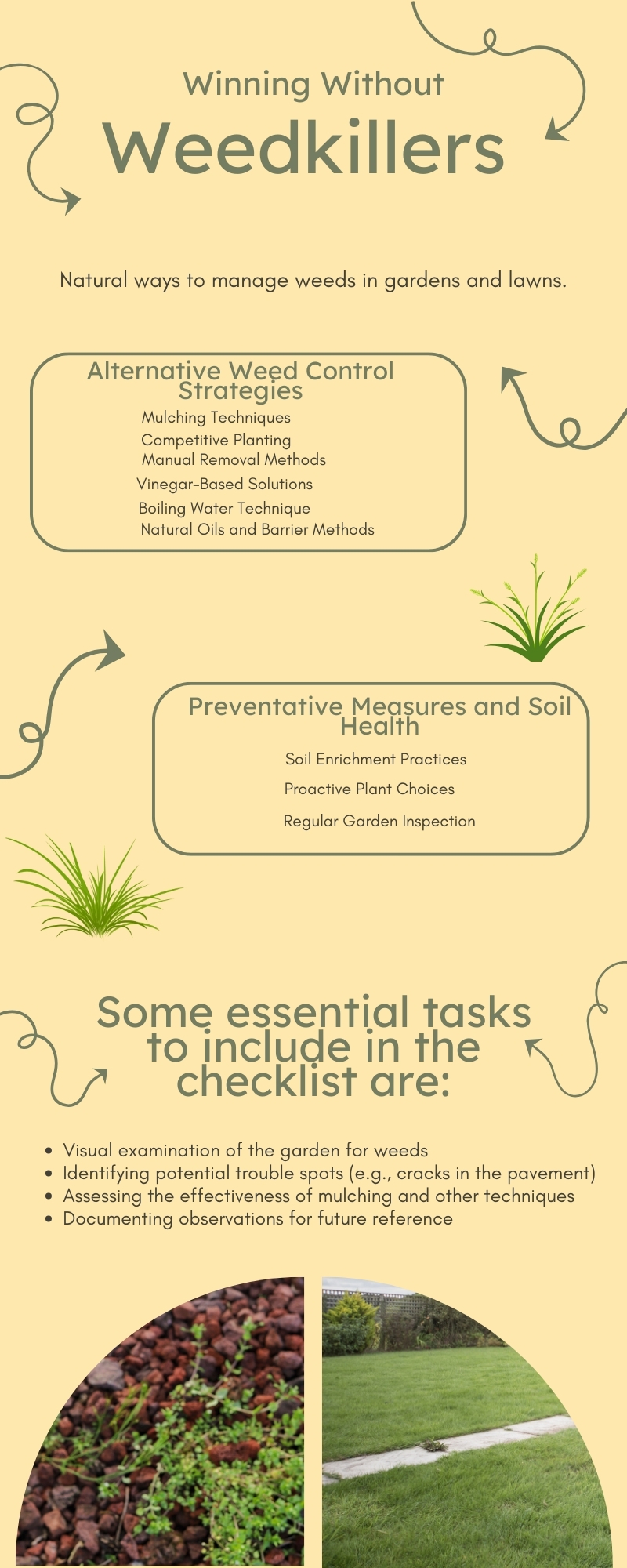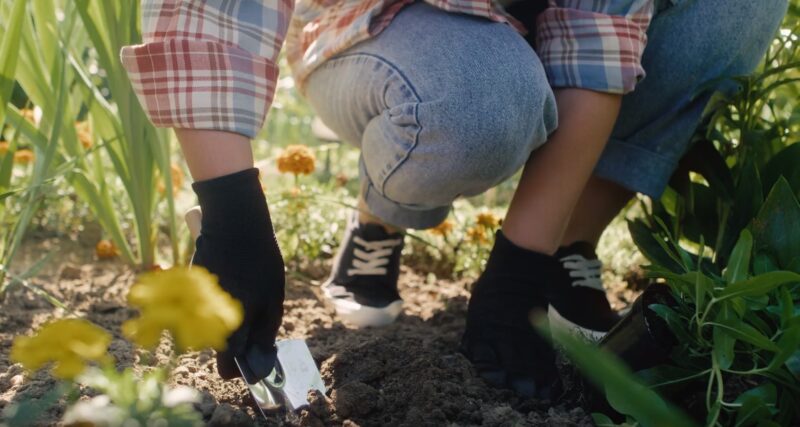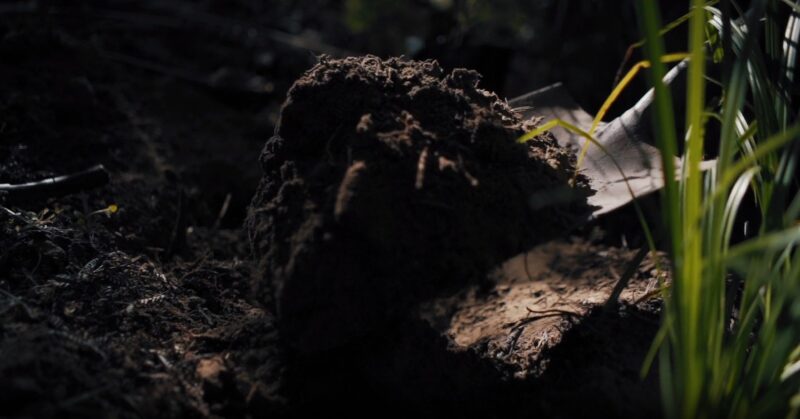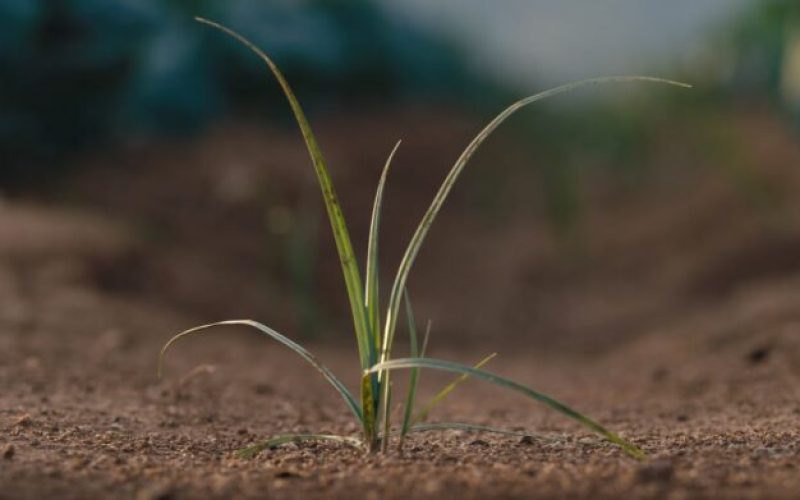I know that synthetic weed killers can harm more than just weeds—they can affect our health and the environment too.
That’s why I’m all about finding natural ways to manage weeds in gardens and lawns.
There are plenty of effective strategies, like better lawn care, using mulch, and certain gardening techniques, that don’t rely on harsh chemicals.
These methods not only keep your outdoor spaces looking great but also protect the planet.
I’m here to guide you through these sustainable practices so you can have a thriving garden or lawn without the negative impacts

Alternative Weed Control Strategies
Mulching Techniques
Mulching is a great way to keep weeds down because it blocks the sunlight they need to grow and acts as a physical barrier.
You can use things like straw, wood chips, and shredded leaves as mulch. Not only do these materials help fight off weeds, but they also make the soil better as they break down.
Just spread a 2-4 inch layer of mulch around your plants, making sure not to pile it up against the stems to avoid rot.
If you’re dealing with a bigger space, you can lay down some cardboard or newspaper first, then top it with your organic mulch.
This method is really good at getting rid of weeds.
Competitive Planting

Another effective way to manage weeds naturally is to plant species that grow faster and stronger than the weeds, essentially outcompeting them for resources.
Choose plants that need similar amounts of water and sunlight and plant them close together.
This way, they’ll fight for sunlight, water, and nutrients, which helps keep the weeds at bay.
Some plants even release chemicals into the soil that prevent weeds from growing.
Clover and creeping thyme are great choices for this method because they cover the ground well.
Manual Removal Methods
Pulling weeds by hand is simple but works well, especially in small gardens or when you’re just dealing with a few weeds here and there.
Using tools like a garden hoe or specialized weed pullers can help you get rid of both tiny and big weeds more easily.
If you’re dealing with really stubborn weeds, pouring hot boiling water directly on them can kill them off without damaging the plants around them.
Vinegar-Based Solutions
Vinegar-based solutions are a green and safe choice compared to chemical weed killers.
The acetic acid in vinegar works by pulling moisture from the weed’s tissues, making it dry out and die.
A well-known product for this purpose is Green Gobbler 20% Vinegar Weed and Grass Killer.
Using a stronger vinegar concentration, like the 20% in this product, tends to kill weeds more effectively.
But, it’s important to be careful when using it because it can harm the plants you want to keep as well.
When we take a look at what happens when vinegar is applied to a weed, we realize the acetic acid in the vinegar ‘burns’ through the wax coating of the weed’s leaf surface and destroys those leaves. If the weeds are annuals – like foxtail, crabgrass or ragweed – and are small at the time of application, perhaps one treatment with the 20% acetic acid vinegar that’s labeled will kill the weed (note that household vinegar is only 5% acetic acid) according to Ohio State University Research.
Boiling Water Technique
Using boiling water to control weeds is an easy and cheap way to deal with unwanted plants in places like patios or driveways.
When you pour boiling water on weeds, it causes their cells to burst and the plant dies.
However, this method can take a lot of effort and time, especially if you’re covering a big area.
Natural Oils and Barrier Methods
Natural oils, like clove, cinnamon, and red thyme, can kill weeds by breaking down their cell walls, which makes them lose water and nutrients.
Products like Earth’s Ally use essential oils in a ready-to-spray format that dries out weeds in a similar way but are easier to apply.
Preventative Measures and Soil Health

Soil Enrichment Practices
To keep weeds at bay and have a flourishing garden, having healthy soil is crucial.
A great way to improve soil health is by adding organic matter like compost.
This not only feeds the soil with vital nutrients but also enhances its structure, making it a better home for helpful microorganisms and improving its ability to hold water.
Rotating different types of plants is also key for keeping soil in good shape.
By planting different plant families in turn, you can keep the soil full of diverse nutrients.
This practice helps break the cycle of pests and weeds and strengthens the soil’s health overall.
Proactive Plant Choices
When picking plants for your garden, go for ones that can outcompete weeds.
Fast-growing ground cover plants are great for this because they take up space and resources, leaving less room for weeds to grow.
By choosing plants that fit well with your local environment, they’ll thrive naturally, reducing the need for chemicals.
Intercropping is another smart way to manage weeds.
This means planting different crops close together.
The varied growth patterns of these plants create competition that keeps weeds in check and boosts your garden’s productivity at the same time.
Regular Garden Inspection

A crucial aspect of winning without weedkillers is implementing regular garden inspections.
It is essential to assess the presence of weeds and their growth stages consistently.
This practice helps in identifying potential problems early and initiating appropriate management strategies.
For example, gardeners can use a monthly inspection checklist to monitor the garden area systematically.
Some essential tasks to include in the checklist are:
Final Words
As we wrap up, let’s remember the importance of managing weeds naturally.
By choosing safe methods like mulching and manual removal, we’re not just tending to our gardens but also protecting the planet.
Whether it’s pulling weeds by hand or using vinegar-based solutions, every effort counts toward a greener, more sustainable future.
Let’s keep nurturing our gardens with care and embracing these natural practices for a healthier environment overall.
I’m Cameron Lowery, an agriculturist based in the beautiful state of Vermont. Through my writing, I’ll guide you on how to maintain your gardens effectively while embracing sustainable practices.

